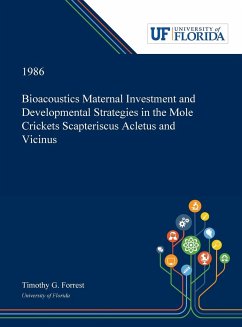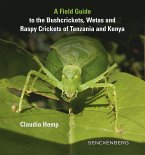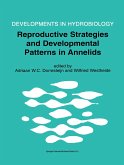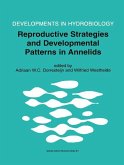Abstract: Three aspects of the reproductive ecology of the southern and tawny mole crickets, Scapteriscus acletus and vicinus. were investigated. Twenty-two sound fields of calling males were measured under field conditions. Total power output ranged from 1.9 to 22.4 uWatt and was positively correlated with male size and soil moisture. Efficiency of sound production was only 0.02 to 0.16 percent. The shape of the sound field approximates a hemisphere. Lifetime oviposition by caged, individual female mole crickets was monitored outdoors. Oviposition is highly seasonal, and females that mature in the fall wait until the following spring to oviposit. Most eggs are laid in May and June and percent hatch of clutches decreases later in the season. Dry weight of eggs, number of eggs per clutch, and percent hatch decrease with successive clutches from individual females. Average investment in eggs per clutch ranged from 10 to 24 percent of female body weight for acletus and from 5 to 16 percent for vicinus females. Lifetime investment (dry weight of eggs) was greater than 100 percent of female body weight (wet weight) for 6 of 12 acletus females, but only 1 of 8 vicinus females had a lifetime investment in eggs equaling its body weight. In acletus. but not vicinus, large females produced more offspring and the average size of their egg clutches was larger than those of smaller females. Insect size tactics and developmental strategies are discussed in relation to decisions individuals make about when to mature. Such decisions carry with them costs and benefits in terms of an individual's fitness. Whenever size affects reproductive success, selection should act such that individuals evaluate the costs and benefits due to changes in size and mature when the cost/benefit ratio is maximized. Predictions about seasonal changes in adult sizes within a natural population of mole crickets are tested. The changes in seasonal distributions of adult sizes of mole crickets support the predictions and suggest that individuals make decisions about when to mature based on costs and benefits associated with changes in size. Dissertation Discovery Company and University of Florida are dedicated to making scholarly works more discoverable and accessible throughout the world. This dissertation, "Bioacoustics Maternal Investment and Developmental Strategies in the Mole Crickets Scapteriscus Acletus and Vicinus" by Timothy G. Forrest, was obtained from University of Florida and is being sold with permission from the author. A digital copy of this work may also be found in the university's institutional repository, IR@UF. The content of this dissertation has not been altered in any way. We have altered the formatting in order to facilitate the ease of printing and reading of the dissertation.
Hinweis: Dieser Artikel kann nur an eine deutsche Lieferadresse ausgeliefert werden.
Hinweis: Dieser Artikel kann nur an eine deutsche Lieferadresse ausgeliefert werden.








